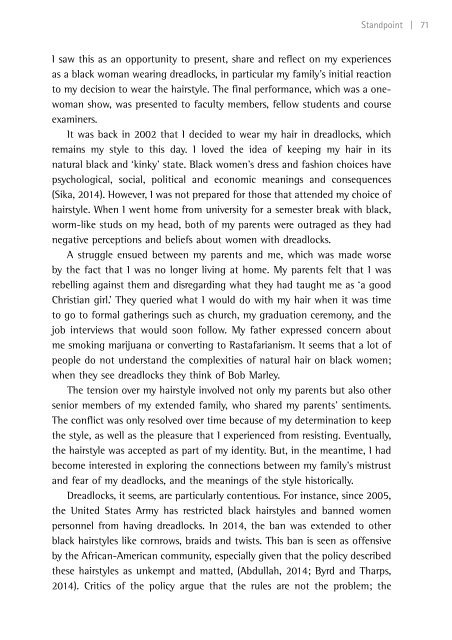The politics of fashion and beauty in Africa
fa21_proof_3
fa21_proof_3
You also want an ePaper? Increase the reach of your titles
YUMPU automatically turns print PDFs into web optimized ePapers that Google loves.
I saw this as an opportunity to present, share <strong>and</strong> reflect on my experiences<br />
as a black woman wear<strong>in</strong>g dreadlocks, <strong>in</strong> particular my family’s <strong>in</strong>itial reaction<br />
to my decision to wear the hairstyle. <strong>The</strong> f<strong>in</strong>al performance, which was a onewoman<br />
show, was presented to faculty members, fellow students <strong>and</strong> course<br />
exam<strong>in</strong>ers.<br />
It was back <strong>in</strong> 2002 that I decided to wear my hair <strong>in</strong> dreadlocks, which<br />
rema<strong>in</strong>s my style to this day. I loved the idea <strong>of</strong> keep<strong>in</strong>g my hair <strong>in</strong> its<br />
natural black <strong>and</strong> ‘k<strong>in</strong>ky’ state. Black women’s dress <strong>and</strong> <strong>fashion</strong> choices have<br />
psychological, social, political <strong>and</strong> economic mean<strong>in</strong>gs <strong>and</strong> consequences<br />
(Sika, 2014). However, I was not prepared for those that attended my choice <strong>of</strong><br />
hairstyle. When I went home from university for a semester break with black,<br />
worm-like studs on my head, both <strong>of</strong> my parents were outraged as they had<br />
negative perceptions <strong>and</strong> beliefs about women with dreadlocks.<br />
A struggle ensued between my parents <strong>and</strong> me, which was made worse<br />
by the fact that I was no longer liv<strong>in</strong>g at home. My parents felt that I was<br />
rebell<strong>in</strong>g aga<strong>in</strong>st them <strong>and</strong> disregard<strong>in</strong>g what they had taught me as ‘a good<br />
Christian girl.’ <strong>The</strong>y queried what I would do with my hair when it was time<br />
to go to formal gather<strong>in</strong>gs such as church, my graduation ceremony, <strong>and</strong> the<br />
job <strong>in</strong>terviews that would soon follow. My father expressed concern about<br />
me smok<strong>in</strong>g marijuana or convert<strong>in</strong>g to Rastafarianism. It seems that a lot <strong>of</strong><br />
people do not underst<strong>and</strong> the complexities <strong>of</strong> natural hair on black women;<br />
when they see dreadlocks they th<strong>in</strong>k <strong>of</strong> Bob Marley.<br />
<strong>The</strong> tension over my hairstyle <strong>in</strong>volved not only my parents but also other<br />
senior members <strong>of</strong> my extended family, who shared my parents’ sentiments.<br />
<strong>The</strong> conflict was only resolved over time because <strong>of</strong> my determ<strong>in</strong>ation to keep<br />
the style, as well as the pleasure that I experienced from resist<strong>in</strong>g. Eventually,<br />
the hairstyle was accepted as part <strong>of</strong> my identity. But, <strong>in</strong> the meantime, I had<br />
become <strong>in</strong>terested <strong>in</strong> explor<strong>in</strong>g the connections between my family’s mistrust<br />
<strong>and</strong> fear <strong>of</strong> my deadlocks, <strong>and</strong> the mean<strong>in</strong>gs <strong>of</strong> the style historically.<br />
Dreadlocks, it seems, are particularly contentious. For <strong>in</strong>stance, s<strong>in</strong>ce 2005,<br />
the United States Army has restricted black hairstyles <strong>and</strong> banned women<br />
personnel from hav<strong>in</strong>g dreadlocks. In 2014, the ban was extended to other<br />
black hairstyles like cornrows, braids <strong>and</strong> twists. This ban is seen as <strong>of</strong>fensive<br />
by the <strong>Africa</strong>n-American community, especially given that the policy described<br />
these hairstyles as unkempt <strong>and</strong> matted, (Abdullah, 2014; Byrd <strong>and</strong> Tharps,<br />
2014). Critics <strong>of</strong> the policy argue that the rules are not the problem; the<br />
St<strong>and</strong>po<strong>in</strong>t | 71



